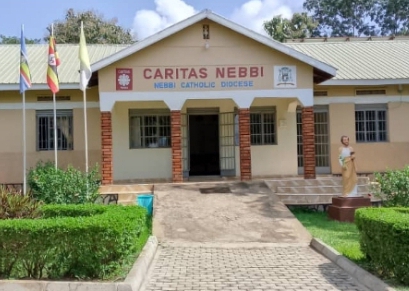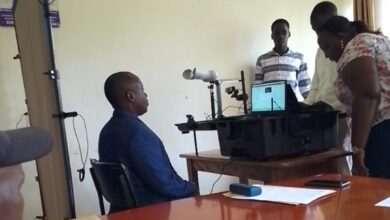Nebbi Catholic Diocese plans to address water scarcity among farmers
He noted the importance of lobbying for cost-effective procurement arrangements, including tax exemptions, to make micro-scale irrigation equipment more affordable.

Nebbi: Caritas Nebbi Catholic Diocese is initiating plans to lobby the central government for increased support for farmers facing water scarcity in the Greater Nebbi area, which includes Zombo, Nebbi, and Pakwach Districts.
This initiative is part of Caritas Nebbi’s commitment to enhancing the socio-economic well-being of the local population.
On October 31, a dialogue on water for production was held at the Nebbi Catholic Parish hall, organized by Caritas Nebbi and Caritas Uganda, with support from Caritas Norway. The meeting brought together local government leaders, civil society organizations, and farmer groups from the three districts to discuss access to irrigation equipment, potentially through loans or as donations to model farmers.
While the Ugandan government has established community irrigation schemes in the region such as those in Ogudu and Wadelai many farmers struggle to utilize these resources fully. Factors such as high costs and lack of knowledge contribute to this issue.
The committee developed 12 key resolutions during the dialogue aimed at improving water accessibility for agricultural production. These resolutions emphasize sustainable water management, knowledge sharing, and the need for consistent monitoring systems, particularly in light of climate change’s impact on weather patterns, including droughts and floods.
Onentho Godfrey Otwi, from the Caritas secretariat in Kampala, highlighted the need for better collaboration among government, NGOs, and farmers to expand irrigation options.
He noted the importance of lobbying for cost-effective procurement arrangements, including tax exemptions, to make micro-scale irrigation equipment more affordable.
“We plan to lobby government to consider cost-effective procurement arrangements including tax exemption, considering that the current one is expensive and partly responsible for the exorbitant price of the micro-scale irrigation equipment” Onentho noted.
The organization recognized government effort in, providing micro-scale irrigation equipment; valley dams in areas such as Acwera in Padwot Sub-county, Ayombira in Atego Sub-county, Pabango in Akworo Sub-county and Nyakiro in Panyimur Sub-county; valley tanks; a surface irrigation scheme in Wadelai; and a small scale scheme in Atyak and Panyango sub-counties serving more farmers with gardens in the surrounding areas.
Joyce Piwa, a board member of Caritas Nebbi, echoed the need for these initiatives, stressing their relevance given the changing climate and its effects on farming practices. The organization aims to bolster agricultural production through enhanced water access, noting the successful support provided to groups in Jangokoro and Panyimur.
“These resolutions will help our farmers because we have seen a lot of changes in the weather pattern, yet our farmers don’t know when to plant and not to plant, we have seen government through their various initiatives coming in with various interventions to promote water for production. So as Caritas, that is one of our initiatives we are championing. Recently, Norway supported some groups in Jangokoro, and Panyimur and they were able to attest the benefits of water for irrigation,’’ said Piwa.
Emmanuel Oyirwoth, an extension worker at Caritas Nebbi, emphasized that water for production is essential for enhancing agricultural productivity and food security,
Caritas Nebbi plans to raise awareness about available irrigation opportunities and encourage the protection of catchment areas through tree planting. They also aim to collaborate with local financial institutions to offer soft loans and social responsibility funds to assist farmers in acquiring subsidized irrigation equipment.
Nebbi District Senior Agricultural Engineer Consulate Angeyango commended Caritas’s efforts but acknowledged the challenge farmers face in co-funding government-established irrigation schemes.
Kakura Emmy Kizio, the executive director of Life Concern, a non-governmental organization based in Zombo, commended Caritas’s strategy in boosting water for production in the community, stressing the need for prioritization of crops with ready market.
Paul Bwire Ogalo, the deputy resident district commissioner of Nebbi, called upon farmers to be organized, assuring that “when you’re very organized, government can co-fund you”
He also called for intensified sensitization of farmers, encouraging them to participate in this project.
Community response
Deogracious Munguryek, a farmer from Serr Parish, Abanga Sub county, Zombo district wrapped with joy welcomed the initiative , revealing that lack of funds for co-funding was a hurdle for them and called for extensive sensitization.
Alokcan Chris Okwir, a farmer from Boro Parish, Panyimur Sub county,Pakwach district, said “ there is need for us to be put in groups, such that we can benefit from the initiative”
Thiwe Anet, a farmer from Acana Sub-County, Nebbi District, said the biggest challenge for them has been co-funding the existing schemes, and expresses hope that the initiative will support their production.
According to the ministry of water and environment, Water for production promote development of cost-effective and sustainable water supply and management for increased production and contribution to the modernization of the agricultural sector in Uganda, focusing on poverty reduction and minimal environmental impacts though, bulk water transfer from areas of plenty to area of scarcity, appropriation of water harvesting technologies for irrigation and livestock development amongst others.
Do you have an advertisement or article you want to publish? Mail us at theugreports@gmail.com or WhatsApp +256394700683.






